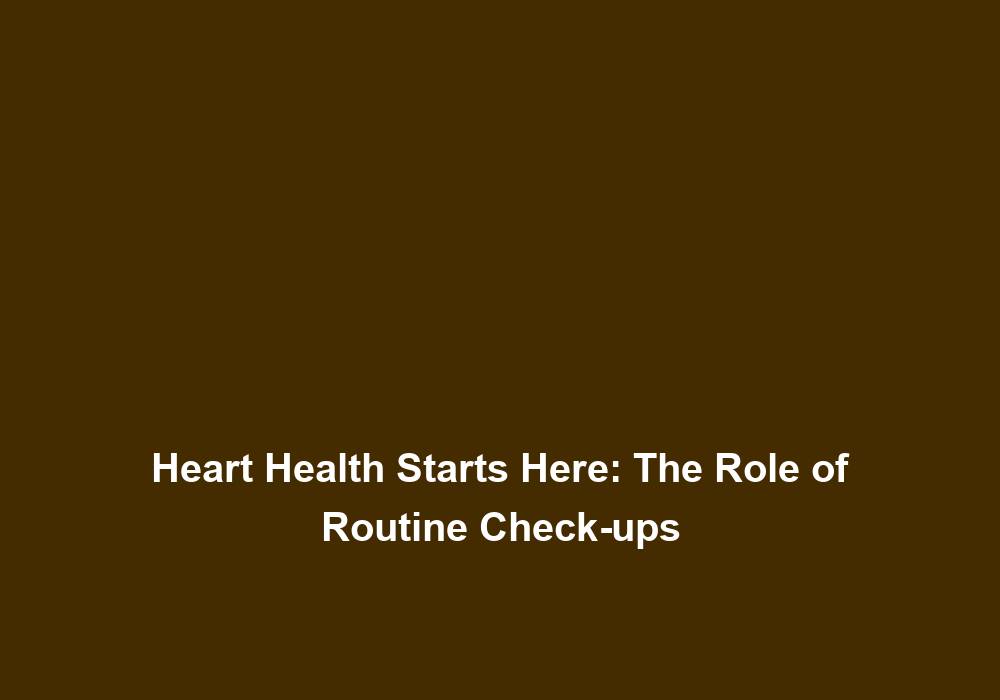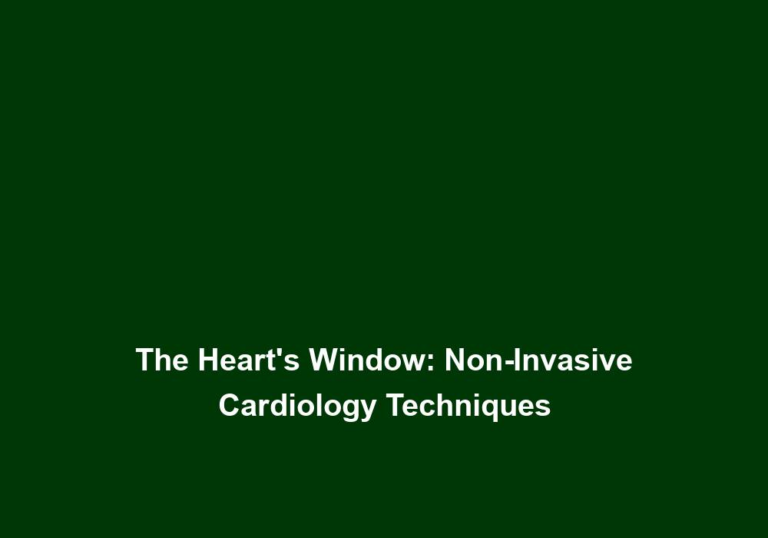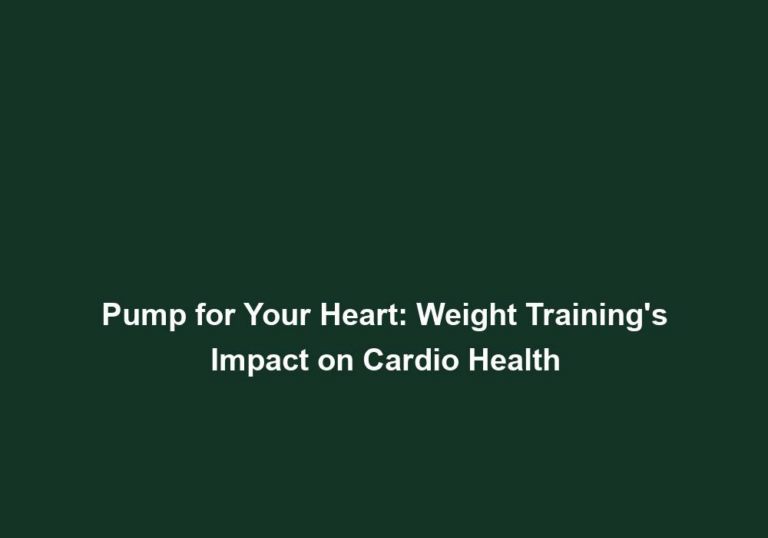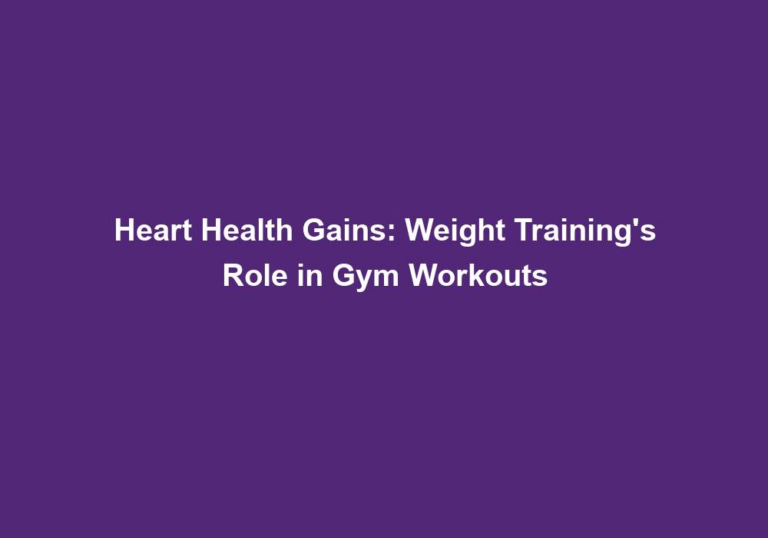Heart Health Starts Here: The Role of Routine Check-ups
Maintaining optimal heart health is crucial for overall wellbeing. While lifestyle choices such as regular exercise and a balanced diet play a significant role, routine check-ups with healthcare professionals are equally important. These check-ups help monitor your heart health, detect potential issues early on, and provide necessary guidance to prevent heart diseases. In this article, we will delve into the significance of routine check-ups in maintaining a healthy heart.
Importance of Routine Check-ups
- Preventive Measures: Regular check-ups allow healthcare professionals to identify risk factors for heart diseases, such as high blood pressure, high cholesterol levels, or diabetes. By detecting these warning signs early, interventions and preventive measures can be implemented to reduce the risk of developing heart-related problems.
Routine check-ups are essential in preventing heart diseases. By regularly visiting healthcare professionals, you give them the opportunity to identify potential risk factors that may lead to heart issues. Conditions like high blood pressure, high cholesterol levels, and diabetes are known to increase the risk of heart diseases. Early detection of these warning signs enables healthcare professionals to implement preventive measures and interventions. For example, if high blood pressure is detected, lifestyle modifications and medications can be prescribed to control it, thereby reducing the risk of developing heart-related problems.
- Assessment of Heart Function: Routine check-ups include a thorough assessment of heart function. This may involve checking blood pressure, heart rate, and conducting tests like an electrocardiogram (ECG) or echocardiogram. These tests aim to identify any abnormalities in heart rhythm, structure, or function.
During routine check-ups, healthcare professionals assess the function of your heart. They check your blood pressure, heart rate, and may conduct tests like an electrocardiogram (ECG) or echocardiogram. These tests provide valuable information about the rhythm, structure, and overall function of your heart. Abnormalities in these areas may indicate underlying heart conditions that require further evaluation and treatment. By identifying these abnormalities early on, healthcare professionals can intervene and provide appropriate management strategies.
- Early Detection of Heart Diseases: Some heart conditions may not exhibit symptoms until they reach an advanced stage. Routine check-ups help in the early detection of heart diseases, such as coronary artery disease or heart valve problems. Timely diagnosis allows for prompt treatment and improves the chances of successful management.
One of the key benefits of routine check-ups is the early detection of heart diseases. Certain heart conditions may not present noticeable symptoms until they have progressed to an advanced stage. By regularly visiting healthcare professionals, potential heart diseases can be identified at an early stage. Conditions like coronary artery disease or heart valve problems can be detected before they become severe. Timely diagnosis is crucial as it allows for prompt treatment and improves the chances of successful management. Early intervention can help prevent complications and improve overall outcomes.
- Guidance on Medication and Lifestyle Modifications: If risk factors or heart diseases are identified during routine check-ups, healthcare professionals can provide appropriate guidance on medication and lifestyle modifications. This may include prescribing medications to control blood pressure or cholesterol, advising on dietary changes, recommending exercise programs, and assisting in smoking cessation.
Routine check-ups not only help in identifying risk factors and heart diseases but also provide valuable guidance on managing these conditions. If risk factors or heart diseases are detected, healthcare professionals can offer appropriate guidance on medication and lifestyle modifications. For example, if high blood pressure or high cholesterol levels are identified, medications may be prescribed to control these conditions. Alongside medications, healthcare professionals can advise on dietary changes, recommend exercise programs tailored to your needs, and assist in smoking cessation. These lifestyle modifications are crucial for reducing the risk of heart diseases and improving overall cardiovascular health.
- Monitoring Existing Heart Conditions: For individuals already diagnosed with heart conditions, routine check-ups play a vital role in monitoring the progression of the disease and evaluating the effectiveness of ongoing treatment plans. Adjustments can be made if necessary to ensure optimal management and prevent complications.
Routine check-ups are particularly important for individuals who have already been diagnosed with heart conditions. These check-ups allow healthcare professionals to monitor the progression of the disease and evaluate the effectiveness of ongoing treatment plans. By closely monitoring the condition, adjustments can be made to the treatment plan if necessary. This ensures that the management of the heart condition remains optimal and helps prevent complications. Additionally, routine check-ups provide an opportunity for individuals to discuss any concerns or symptoms they may be experiencing with their healthcare provider.
Frequency of Routine Check-ups
The frequency of routine check-ups may vary depending on individual factors, such as age, medical history, and existing risk factors. However, generally, it is recommended to have a comprehensive check-up at least once a year. This allows for a comprehensive evaluation of your heart health and provides an opportunity to discuss any concerns or symptoms with your healthcare provider.
The frequency of routine check-ups depends on various factors specific to each individual. These factors include age, medical history, and existing risk factors. While the exact frequency may vary, it is generally recommended to have a comprehensive check-up at least once a year. This annual check-up allows healthcare professionals to conduct a thorough evaluation of your heart health. It provides an opportunity to review your medical history, assess any changes in risk factors, and discuss any concerns or symptoms you may have. Regular check-ups ensure that any potential issues are identified early on and appropriate actions are taken to maintain a healthy heart.
What to Expect During a Routine Check-up
During a routine check-up focused on heart health, several aspects will be assessed and discussed. These may include:
1. Medical History Review
Your healthcare provider will review your medical history, including any previous heart conditions, surgeries, or family history of heart diseases. This information helps in identifying potential risk factors and guiding further evaluations.
During a routine check-up, your healthcare provider will review your medical history. This includes looking into any previous heart conditions, surgeries, or family history of heart diseases. Reviewing your medical history is crucial as it helps identify potential risk factors for heart diseases. It also guides healthcare professionals in determining which further evaluations or tests may be necessary.
2. Physical Examination
A physical examination will be conducted, which may involve measuring your blood pressure, heart rate, and weight. These basic measurements provide insights into your overall health and heart function.
As part of a routine check-up, a physical examination will be conducted. This examination may involve measuring your blood pressure, heart rate, and weight. These basic measurements provide valuable insights into your overall health and heart function. For example, high blood pressure may indicate an increased risk of heart diseases. By regularly monitoring these measurements, healthcare professionals can detect any changes or abnormalities that may require further evaluation.
3. Blood Tests
Blood tests may be recommended to assess cholesterol levels, blood sugar levels, and other relevant parameters. These tests can help identify abnormalities that may contribute to heart diseases or indicate the presence of existing conditions.
During a routine check-up, blood tests may be recommended to assess various parameters related to heart health. These tests commonly include measuring cholesterol levels and blood sugar levels. Abnormalities in these parameters can contribute to the development of heart diseases. Blood tests also help identify the presence of existing conditions that may impact heart health. By analyzing these test results, healthcare professionals can gain a better understanding of your heart health and tailor their recommendations accordingly.
4. Additional Diagnostic Tests
Depending on your medical history and physical examination findings, your healthcare provider may recommend further diagnostic tests. These tests can include an electrocardiogram (ECG), echocardiogram, stress test, or cardiac imaging studies. These investigations provide detailed information about your heart’s structure and function.
In some cases, based on your medical history and physical examination findings, additional diagnostic tests may be recommended. These tests provide more detailed information about your heart’s structure and function. Common additional tests include an electrocardiogram (ECG), echocardiogram, stress test, or cardiac imaging studies. An ECG measures the electrical activity of your heart, while an echocardiogram uses sound waves to create images of your heart’s structure and function. A stress test involves monitoring your heart while you exercise, and cardiac imaging studies provide detailed images of your heart. These tests help healthcare professionals assess your heart health more comprehensively and make more accurate diagnoses.
5. Lifestyle Counseling
During routine check-ups, healthcare professionals offer guidance on maintaining a heart-healthy lifestyle. They may discuss the importance of regular exercise, a balanced diet, stress management techniques, and the dangers of smoking or excessive alcohol consumption. Lifestyle modifications are essential for reducing the risk of heart diseases and improving overall cardiovascular health.
As part of routine check-ups, healthcare professionals provide lifestyle counseling to promote heart-healthy habits. They emphasize the importance of regular exercise, following a balanced diet, managing stress effectively, and avoiding smoking or excessive alcohol consumption. Regular exercise helps improve cardiovascular fitness, while a balanced diet ensures the intake of essential nutrients for heart health. Effective stress management techniques can help reduce the risk of heart diseases, as stress can negatively impact heart function. Furthermore, healthcare professionals educate individuals about the dangers of smoking and excessive alcohol consumption, as these habits significantly increase the risk of heart diseases. By incorporating these lifestyle modifications, individuals can take proactive steps to reduce their risk of developing heart-related problems.
Conclusion
Routine check-ups serve as a cornerstone for maintaining heart health. Regular assessments and evaluations allow for the early detection of heart diseases, the implementation of preventive measures, and the provision of necessary guidance on lifestyle modifications and medications. By prioritizing routine check-ups and working closely with healthcare professionals, you can take proactive steps towards ensuring a healthy heart and a better quality of life.







